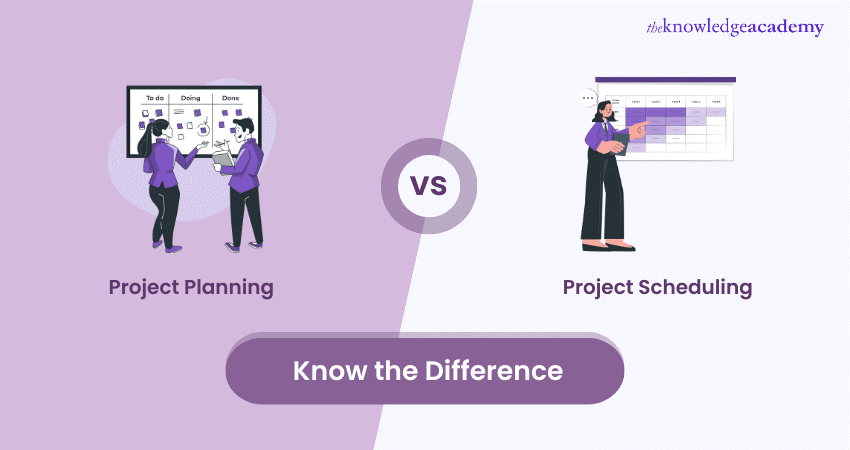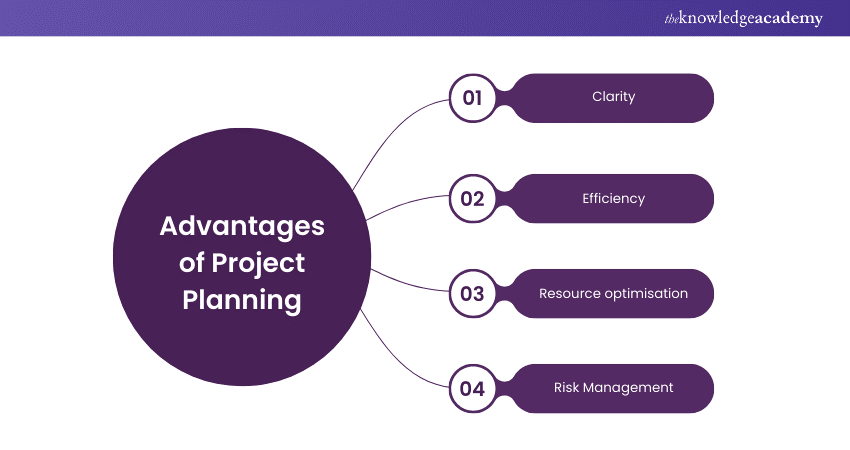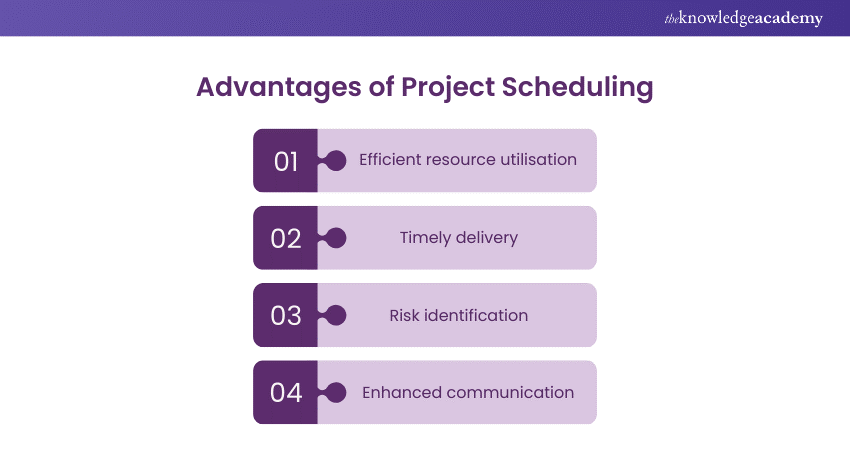We may not have the course you’re looking for. If you enquire or give us a call on 01344203999 and speak to our training experts, we may still be able to help with your training requirements.
We ensure quality, budget-alignment, and timely delivery by our expert instructors.

Project Management includes meticulously crafting the roadmap to turn that vision into reality. At the heart of this journey lie two indispensable processes: Project Planning Vs Project Scheduling. While often used interchangeably, you can see these terms represent distinct phases in the life cycle of any endeavour. Each has its unique significance in steering projects toward triumph. Moreover, Project Planning is akin to laying the foundation for your architectural marvel. While Project Scheduling orchestrates the intricate interplay of tasks and timelines.
So, you can read this blog to unravel the nuances of Project Planning Vs Project Scheduling. We will also help you discover how mastering these twin pillars can unlock the door to project success.
Table of Contents
1) What is Project Planning?
2) What is Project Scheduling?
3) Difference between Project Planning and Project Scheduling
a) Objective
b) Timing
c) Source of information
d) Term
e) Benefits
f) Durability
g) Uses
h) Relationship
i) Techniques
4) Conclusion
What is Project Planning?
Project Management considers Project Planning as an essential step. It entails specifying the objectives of the project, determining the tasks, calculating the resources needed, setting deadlines, and so on. Project Planning basically lays the groundwork for the whole undertaking.
Phases of Project Planning
Numerous factors make up the Project Planning stages. Several of those factors are discussed below:
a) Initiation: During this crucial phase, the project's purpose, scope, and feasibility are carefully evaluated. In addition, the process includes selecting a capable Project Manager to supervise the planning phase and enable efficient decision-making.
b) Planning: Project success is largely dependent on meticulous Planning, which includes a thorough analysis of all tasks, activities, and deadlines. Project Planners, thus, meticulously schedule activities, considering dependencies and sequencing to optimise efficiency.
c) Execution: With the final project plan, the execution phase commences. Here, resources are mobilised, and tasks are assigned to team members. Herein, the Project Manager plays a central role in overseeing progress. They also promptly address any issues promptly and adapt to unforeseen circumstances to keep the project on track.
d) Monitoring and controlling: Continuous monitoring of project progress is essential for identifying deviations from the plan. By implementing robust control mechanisms, Project Managers can maintain alignment with objectives. They can maintain quality standards throughout the project life cycle and further optimise the use of resources.
e) Closing: As the project nears completion, the closing phase involves delivering final outputs to Stakeholder. Moreover, project reviews are conducted to analyse lessons, identify areas for improvement, and document best practices for future projects. The formal closure also ensures that project outcomes are transitioned effectively.
Advantages of Project Planning
Through effective Project Planning, professionals can experience amazing advantages. A few of them are discussed below:

a) Clarity: Well-defined project objectives and timetables can foster better communication and accountability among team members. Team members can effectively drive project success with a clearly defined plan.
b) Efficiency: A project can proceed more smoothly if there is a lower likelihood of delays or setbacks. Hence, over the course of a project, Project Planners must effectively plan to overcome possible obstacles and devise backup plans.
c) Resource optimisation: Achieving optimal productivity and reducing waste can be achieved by adequately allocating and utilising resources. Organisations can optimise equipment and financial resources through strategic resource management and accomplish project goals within budgetary limits.
d) Risk Management: Project Planning lessens the potential hazards' impact by guaranteeing project success and stakeholder satisfaction. Essentially, Project Managers can reduce losses, boost stakeholder confidence and safeguard project objectives.
Take the next step in your career journey with our comprehensive PMP Training – join us now!
What is Project Scheduling?
The plan that directs a project from start to finish is called Project Scheduling. It also includes a thorough task list, resource allocation, and schedules for every action. The fundamental components of Project Scheduling are those that guarantee efficient development and prompt delivery of results.
Phases of Project Scheduling
The stages of Project Scheduling are comprised of several variables. Below is a discussion of a few of those factors:
a) Task identification: The initial stage of Project Scheduling entails classifying and identifying every activity necessary to accomplish the project's goals. Every task is well documented, including any dependencies it has on other tasks.
b) Sequence determination: Upon task identification, dependencies and restrictions are considered when determining the task sequence. This phase ensures that tasks are completed logically to reduce delays and increase efficiency.
c) Resource allocation: Resources are assigned to each work according to availability and skill needs. These resources include personnel, equipment, and supplies. Allocating resources wisely guarantees that project activities receive sufficient support for the project's duration.
d) Time estimation: Each activity is allocated a duration estimate based on variables including effort, complexity, and resource availability. Maintaining stakeholder expectations and creating a realistic project plan both depend on accurate time estimation.
e) Schedule development: Based on task sequencing, resource allocation, and time estimation, a comprehensive project plan is developed. This schedule also includes the beginning and ending dates of every task and provides a clear road map for carrying out the project.
Elevate your career to new heights with our Program Management Professional (PgMP) Training – join us now!
Advantages of Project Scheduling
Professionals can get incredible benefits through efficient Project Scheduling. Here is a discussion of a handful of them:

a) Efficient resource utilisation: By aligning resource allocation with task requirements, Project Scheduling ensures optimal utilisation of available resources. This also minimises waste and maximises productivity, leading to cost savings and improved Project efficiency.
b) Timely delivery: Clear timelines and deadlines established through Project Scheduling keep the project on track and ensure timely delivery of deliverables. This further enhances stakeholder satisfaction and maintains project momentum.
c) Risk identification: Early identification of potential Scheduling conflicts allows for proactive Risk Management and mitigation strategies. By anticipating and addressing Scheduling challenges, project teams can minimise disruptions and prevent delays.
d) Enhanced communication: A well-defined project schedule serves as a communication tool, facilitating effective collaboration among team members, stakeholders, and clients. Clear timelines and milestones ensure that everyone involved is aware of project progress and can coordinate efforts accordingly. This fosters transparency, accountability, and alignment of expectations throughout the project life cycle.
Safeguard Projects against risks by registering for our PMI-RMP Certification Training!
Difference between Project Planning and Project Scheduling
Project Planning and Project Scheduling represent distinct Project Management phases. While Planning sets the foundation by defining goals and objectives, Scheduling focuses on establishing timelines and task sequences. For a better overview of their differences, you can go through the following points:
1) Objective
Project Planning aims to define project goals, scope, and objectives for a strategic overview of the project. However, Project Scheduling focuses on establishing timelines and task sequences to ensure efficient execution of the plan.
2) Timing
Planning occurs at the outset of the project life cycle, where key decisions are made regarding project direction and scope. Conversely, Scheduling takes place during the Planning phase and continues throughout project execution, ensuring tasks are completed on time.
3) Source of information
Planning relies on inputs such as project scope, requirements, and stakeholder expectations to develop a comprehensive project plan. In contrast, Scheduling relies on task dependencies, resource availability, and duration estimates to create a detailed project Schedule.
4) Term
Planning involves creating a strategic project plan that outlines project objectives, deliverables, and milestones. In contrast, Scheduling involves developing a detailed project Schedule that specifies when and by whom each task will be performed.
Confidently lead projects with our PMI-ACP Certification Training – register today!
5) Benefits
Planning ensures clarity of project goals, scope, and resource allocation, laying the foundation for project success. Conversely, Scheduling ensures timely execution of tasks and efficient resource utilisation, driving project progress towards completion.
6) Durability
Planning documents may undergo revisions as project requirements evolve or change. In contrast, Scheduling may require adjustments based on real-time progress and unforeseen events to maintain project momentum.
7) Uses
Planning is essential for setting project direction, defining scope, and aligning stakeholders' expectations. Meanwhile, Scheduling is crucial for day-to-day task management, resource allocation, and monitoring progress to ensure project objectives are met.
8) Relationship
Planning lays the groundwork for Scheduling by defining project objectives, requirements, and constraints. However, Scheduling implements the plan by establishing timelines, task sequences, and resource allocations to execute the project effectively.
9) Techniques
Planning may involve techniques such as SWOT analysis, stakeholder analysis, and risk assessment to identify project risks and opportunities. Conversely, Scheduling employs techniques like Gantt charts and review techniques to create detailed schedules and manage project timelines effectively.
Conclusion
In conclusion, both Project Planning and Project Scheduling are integral components that serve distinct purposes in ensuring project success. By comprehending both Project Planning Vs Project Scheduling practices, Project Managers can effectively navigate project complexities. This also helps in resource optimisation resource utilisation and achieving project objectives.
Accelerate your project Management journey with the PMI Scheduling Professional SP Training!
Frequently Asked Questions
What is the Project Life Cycle (PLC) in Project Management?

PLC in Project Management stands for Project Life Cycle. It specifically refers to the series of Project Management phases. From initiation to completion, including planning, execution, monitoring, and closure, everything falls under this cycle.
What are project Planning tools?

Project Planning tools are techniques that can facilitate the creation, organisation, and management of project plans. Those tools include Gantt charts, PERT charts, Project Management software, and collaborative online platforms.
What are the other resources and offers provided by The Knowledge Academy?

The Knowledge Academy takes global learning to new heights, offering over 3,000 online courses across 490+ locations in 190+ countries. This expansive reach ensures accessibility and convenience for learners worldwide.
Alongside our diverse Online Course Catalogue, encompassing 19 major categories, we go the extra mile by providing a plethora of free educational Online Resources like News updates, Blogs, videos, webinars, and interview questions. Tailoring learning experiences further, professionals can maximise value with customisable Course Bundles of TKA.
What is the Knowledge Pass, and how does it work?

The Knowledge Academy’s Knowledge Pass, a prepaid voucher, adds another layer of flexibility, allowing course bookings over a 12-month period. Join us on a journey where education knows no bounds.
What are related courses and blogs provided by The Knowledge Academy?

The Knowledge Academy offers various Project Planning and Control Courses, including the Project Planning and Control™ (PPC) Foundation and Project Planning and Control™ (PPC) Practitioner. These courses cater to different skill levels, providing comprehensive insights into PI Planning.
Our Project Management Blogs cover a range of topics related to Project Planning and Scheduling, offering valuable resources, best practices, and industry insights. Whether you are a beginner or looking to advance your Project Management skills, The Knowledge Academy's diverse courses and informative blogs have got you covered.
Upcoming Project Management Resources Batches & Dates
Date
 PMP® Certification Training Course
PMP® Certification Training Course
Sat 5th Apr 2025, Sun 6th Apr 2025
Mon 7th Apr 2025
Mon 14th Apr 2025
Sat 19th Apr 2025, Sun 20th Apr 2025
Tue 22nd Apr 2025
Mon 28th Apr 2025
Sat 3rd May 2025, Sun 4th May 2025
Tue 6th May 2025
Mon 12th May 2025
Sat 17th May 2025, Sun 18th May 2025
Mon 19th May 2025
Tue 27th May 2025
Mon 2nd Jun 2025
Sat 7th Jun 2025, Sun 8th Jun 2025
Mon 9th Jun 2025
Mon 16th Jun 2025
Sat 21st Jun 2025, Sun 22nd Jun 2025
Mon 23rd Jun 2025
Mon 30th Jun 2025
Sat 5th Jul 2025, Sun 6th Jul 2025
Mon 7th Jul 2025
Mon 14th Jul 2025
Sat 19th Jul 2025, Sun 20th Jul 2025
Mon 21st Jul 2025
Mon 28th Jul 2025
Sat 2nd Aug 2025, Sun 3rd Aug 2025
Mon 4th Aug 2025
Mon 11th Aug 2025
Sat 16th Aug 2025, Sun 17th Aug 2025
Mon 18th Aug 2025
Tue 26th Aug 2025
Mon 1st Sep 2025
Sat 6th Sep 2025, Sun 7th Sep 2025
Mon 8th Sep 2025
Mon 15th Sep 2025
Sat 20th Sep 2025, Sun 21st Sep 2025
Mon 22nd Sep 2025
Mon 29th Sep 2025
Sat 4th Oct 2025, Sun 5th Oct 2025
Mon 6th Oct 2025
Mon 13th Oct 2025
Sat 18th Oct 2025, Sun 19th Oct 2025
Mon 20th Oct 2025
Mon 27th Oct 2025
Mon 3rd Nov 2025
Sat 8th Nov 2025, Sun 9th Nov 2025
Mon 10th Nov 2025
Mon 17th Nov 2025
Sat 22nd Nov 2025, Sun 23rd Nov 2025
Mon 24th Nov 2025
Mon 1st Dec 2025
Sat 6th Dec 2025, Sun 7th Dec 2025
Mon 8th Dec 2025
Mon 15th Dec 2025
Sat 20th Dec 2025, Sun 21st Dec 2025






 Top Rated Course
Top Rated Course



 If you wish to make any changes to your course, please
If you wish to make any changes to your course, please


